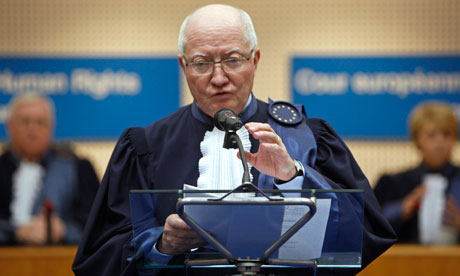Jean-Paul Costa says Britain will be resorting to the tactics of the Greek colonels in 1967 if it does not comply with ECHR ruling
Nicholas Watts, Guardian, Wednesday 16 February 2011 20.15 GMT
 Jean-Paul Costa, president of the European Court of Human Rights warned David Cameron against challenging the court's decision on prisoner votes. Photograph: Vincent Kessler/Reuters
Jean-Paul Costa, president of the European Court of Human Rights warned David Cameron against challenging the court's decision on prisoner votes. Photograph: Vincent Kessler/ReutersBritain would be behaving like a dictatorship if it refuses to comply with a ruling by the European Court of Human Rights that a blanket ban preventing prisoners from voting must be lifted, the president of the court has warned.
A week after MPs voted overwhelmingly to uphold the ban, Jean-Paul Costa said that Britain would be resorting to the tactics of the Greek colonels who seized power in Athens in 1967 if it rejected the court.
The president of the Strasbourg court spoke out as Downing Street sources said that David Cameron's hopes of limiting the powers of the ECHR will be postponed until after the general election in 2015.
The prime minister told MPs that a commission to examine the creation of a British Bill of Rights – promised in the coalition agreement – will be launched soon.
No 10 sources said the commission would be limited because there are "red lines" which cannot be crossed under the Tories' coalition agreement with the pro-European Liberal Democrats. The Lib Dem red lines are not amending Britain's human rights act and not pulling out of the ECHR.
Cameron will reach out to Tory eurosceptics by establishing a separate body that will draw up proposals on how to limit the powers of the court that will be included in the Conservative manifesto for the 2015 general election. "These issues are difficult in the coalition," one Tory government source said. "It is not realistic to introduce these changes before 2015. It is quite a complicated area so we will draw up our own proposals that will be bulletproof."
Downing Street was given a warning of the dangers of challenging the ECHR by its president who told the BBC that it would be a "disaster" for Britain to withdraw from the court or to challenge its ruling on prisoners. Jean-Paul Costa told the BBC Parliament Record Review programme: "For the image of Britain I will say a simple things and again I hope this will not be considered as not respectful. The only country which denounced the convention actually was Greece in 1967 at the time of dictatorship of the colonels. Of course after seven years when democracy was restored in Greece [which] returned to Council of Europe and the convention. I cannot imagine – even if I can understand some irritation that [the] UK which is a great country I admire the UK – could be in the same situation as the colonels in 1967."
The president dissented against the court's ruling that the prisoner vote ban must be lifted. However, he said it was his duty as president to uphold the agreed decision.

No comments:
Post a Comment